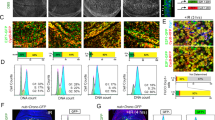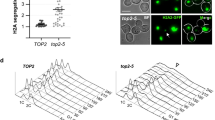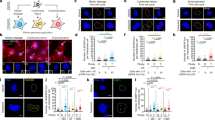Abstract
It has been established that mutations in Drosophila Polo cause abnormalities in mitosis1. In human cells, maximal Plk activity is reached in the M phase of the cell cycle, and the function of Plk is therefore considered to be required for mitotic cellular events such as spindle formation, chromosome segregation and cytokinesis. Microinjection of anti-Plk antibody into living cells has been found to induce a mitotic abnormality that contributes to the generation of aneuploidy2, and this is an important finding in relation to tumour development. Indeed, previous studies have shown that the level of expression of a mitotic checkpoint gene, hsMAD2, is reduced3 and that another checkpoint gene, BUB1, is mutated in certain human cancer cells4.
This is a preview of subscription content, access via your institution
Access options
Subscribe to this journal
Receive 12 print issues and online access
$209.00 per year
only $17.42 per issue
Buy this article
- Purchase on Springer Link
- Instant access to full article PDF
Prices may be subject to local taxes which are calculated during checkout


Similar content being viewed by others
References
Sunkel, C. E. & Glover, D. M. J. Cell Sci. 89, 25–38 (1988).
Lane, H. A. & Nigg, E. A. J. Cell Biol. 135, 1701–1713 (1996).
Li, Y. & Benezra, R. Science 274, 246–248 (1996).
Cahill, D. P. et al. Nature 392, 300–303 (1998).
Buchner, J. Trends Biochem. Sci. 24, 136–141 (1999).
Whitesell, L., Mimnaugh, E. G., De Costa, B., Myers, C. E. & Neckers, L. M. Proc. Natl Acad. Sci. USA 91, 8324–8328 (1994).
Schulte, T. W., Blagosklonny, M. V., Ingui, C. & Neckers, L. J. Biol. Chem. 270, 24585–24588 (1995).
Stepanova, L., Leng, X., Parker, S. B. & Harper, J. W. Genes Dev. 10, 1491–1502 (1996).
Golsteyn, R. M., Mundt, K. E., Fry, A. M. & Nigg, E. A. J. Cell Biol. 129, 1617–1628 (1995).
Feng, Y. et al. Biochem. J. 339, 435–442 (1999).
Lane, H. A. & Nigg, E. A. Trends Cell Biol. 7, 63–68 (1997).
Glover, D. M., Hagan, I. M. & Tavares, A. A. M. Genes Dev. 12, 3777–3787 (1998).
Pine, J. Nature Cell Biol. 1, E73–E79 (1999).
Hutchison, K. A., Stancato, L. F., Jove, R. & Pratt, W. B. J. Biol. Chem. 267, 13952–13957 (1992).
Golsteyn, R. M. et al. J. Cell Sci. 107, 1509–1517 (1994).
Acknowledgements
We thank G. Marriott and L. M. Neckers for critical comments on the manuscript, T. Sudo and R. Hamamoto for discussions, and Y. Ichikawa for DNA-sequence analysis. This study was supported in part by a Grant-in-Aid from the Ministry of Education, Science, Sports and Culture of Japan, by the Multibioprobe project (RIKEN), and by funding for a special postdoctoral program (to S.S.).
Author information
Authors and Affiliations
Corresponding author
Rights and permissions
About this article
Cite this article
Simizu, S., Osada, H. Mutations in the Plk gene lead to instability of Plk protein in human tumour cell lines. Nat Cell Biol 2, 852–854 (2000). https://doi.org/10.1038/35041102
Received:
Revised:
Accepted:
Published:
Issue Date:
DOI: https://doi.org/10.1038/35041102
This article is cited by
-
PLK1 promotes proliferation and suppresses apoptosis of renal cell carcinoma cells by phosphorylating MCM3
Cancer Gene Therapy (2020)
-
Immune adaptor SKAP1 acts a scaffold for Polo-like kinase 1 (PLK1) for the optimal cell cycling of T-cells
Scientific Reports (2019)
-
Oncogenic potential of BEX4 is conferred by Polo-like kinase 1-mediated phosphorylation
Experimental & Molecular Medicine (2018)
-
Plk1 overexpression induces chromosomal instability and suppresses tumor development
Nature Communications (2018)
-
Cell cycle proteins as promising targets in cancer therapy
Nature Reviews Cancer (2017)



